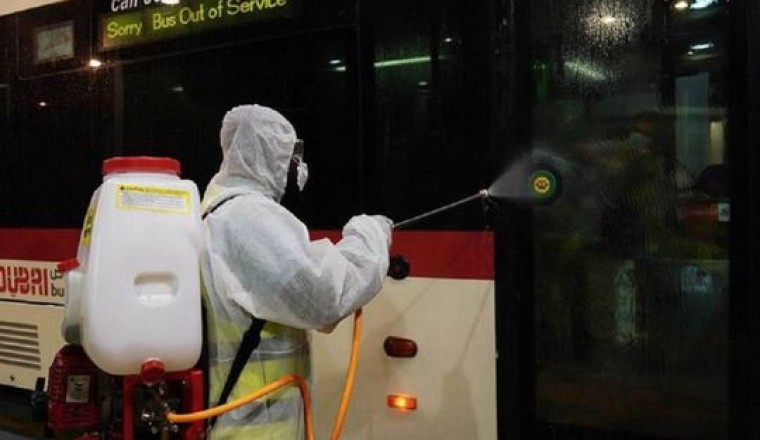
COVID-19: Everything UAE residents should know during coronavirus restrictions
Dubai: The last weekend (March 26,27,28) saw the first three days of the sterlisation drive adopted across the UAE to combat the spread of the coronavirus disease, COVID-19. The drive, which occurs at night from 8pm to 6am, has been extended for a week and will go on until April 5.
Can I go out during the day?
Depends on where you are going.
UAE's #StayHome campaign focuses on making sure that residents stay home at all times unless absolutely necessary. You can go out for work or to purchase essentials such as grocery items or medicines. To make sure people stay home as much as possible, UAE authorities have issued a list of fines as well.
You could end up paying a Dh2,000 fine if your trip outside is non-essential.
Restaurants are closed for dine-in and delivery is active so you cannot go out to eat. Malls are closed and so are other entertainment avenues. Schools have been closed for over two weeks now.
Can I go out during the night?
Not unless you are registered.
The UAE sterilisation drive has been extended for a week, so residents have been told to strictly stay home from 8pm to 6am. Guidelines have been issued to stay home along with fines for violators of restrictions. Violators will end up paying a fine of Dh3,000.
If you still need to go out during this time, register on this official website. Public transportation will also be suspended during these hours (8pm to 6am) until April 5, Sunday to enforce the restriction.
Did not speed, but got a radar flash?
Radars flag speeding vehicles are now being used to identify motorists who do not comply with the authorities’ call to stay at home during the national sterilisation drive in Dubai, an official said on Friday. This is active from 8pm to 6am.
“Only people who have registered on the website and received approval will be allowed to leave [their] home in Dubai. We received many calls from motorists tonight [asking about the flashing radars in spite of] driving under speed limits,” the official added.
Can I take the metro or the bus?
Public transportation in Dubai will be operational during non-curfew timings. RTA used its social media accounts to confirm that intercity bus timings have changed, and pointed out that all metro trains will run until 8pm before the curfew begins.
The last journey on the Red Line will depart at 6.02pm from Rashidiya Station to UAE Exchange Station, and at 6.02pm from UAE Exchange Station to Rashidiya Station. On the Green Line, the last train will depart from Creek Station to Etisalat Station at 6.13pm, and and the last train departs from Etisalat Station to Creek Station at 6.17pm. The last intercity bus service will start at 4pm to Abu Dhabi and Fujairah, and 5pm to Ajman and Sharjah.
Further steps taken by the Roads and Transport Authority (RTA) include the disinfection and sterilisation of metro carriages, public buses, taxis and marine transport, with around 1,000 workers solely dedicated to the task. Furthermore, all bus shelters in Dubai have been closed temporarily as part of precautionary steps.
Bus doors will be controlled by the driver. The front and middle doors will be opened, and the rear door will remain shut.
How many people in your car or a taxi?
Not more than 3 including the person who is driving.
The UAE Ministry of Interior and the National Emergency and Crisis and Disasters Management Authority, on March 23, stated: "The public are also urged to use their own family cars with a maximum of three individuals per vehicle."
As for taxis, a maximum number of two passengers can now travel in a taxi in Dubai, the RTA announced on Wednesday.
Motorists who violate this rule of three will be liable to a fine of Dh1,000.
Grocery shopping rules
Essential grocery shopping is allowed during non-curfew hours. However, the same social distancing and movement limits apply in terms of restrictions in vehicles, public transport etc.
Pharmacies, and food retail outlets in the UAE, including cooperative societies, grocery stores, and supermarkets, will be allowed to operate 24 hours, provided shoppers inside do not exceed 30 per cent of the total capacity. Home delivery is also active for many stores.
Precautionary measures
Many supermarkets have started standard sanitisation procedures including sanitising trolleys before and after each use. Customers at some supermarkets are being handed gloves to enable easy and clean handling of products in the store. Social distancing rules (physical distance of two metres) apply in payment queues.
Supermarkets in malls
Since malls are closed, mall entrances will remain open to allow access to supermarkets only.
Food orders
You can order food delivery.
UAE officials confirmed to Gulf News that food deliveries are allowed during the sterilisation period. Bakeries are open for delivery as well.
When asked by Gulf News, many restaurants in Dubai confirmed that they would not be accepting customers who came in store to pick-up their food and instead referred customers to Talabat, Zomato, Deliveroo and Uber Eats to place their orders and get food delivered direct to their door.
Restaurants could pay a fine of Dh50,000 if they violate closure instructions, while visitors of these closed establishments will end up paying a fine of Dh500.
Can I have a party or a small gathering at home?
No.
Residents should not plan private gatherings of any scale as this will be a direct violation of one of the rules in line with the COVID-19 precautionary measures. The person who arranges such a gathering will be liable to a fine of Dh10,000 while participants will end up paying Dh5,000 each.
Public gatherings, events etc. are also subject to this rule.
Can I get laundry services?
According to the Dubai Economy directive, laundries are open for business. Experts say that while the actual process of washing with powerful industrial grade detergents at a high temperature inactivates the virus, the real threat would the manner in which the clothes are handled and the number of hands it passes through before being packaged.
Speaking about this, Dr Kamal Akkach, Internal Medicine Consultant at King’s College Hospital of London in UAE told Gulf News, "Take precautions not to take the parcel in. As the delivery boy, to leave it on your door step. Using gloves, you extract your clothes and discard the outer bag outside. Bring only the clothes in.”
Should I wear a mask?
UAE announced a Dh1,000 fine for not wearing medical masks in closed places, for chronic disease patients and people suffering from symptoms of colds and influenza, and not taking into account the safe distance between people.
WHO directives say that if you are healthy, you only need to wear a mask if you are taking care of a person with suspected COVID-19 infection. WHO also directs people to wear a mask if you are coughing or sneezing.



















Facebook Conversations
Disqus Conversations